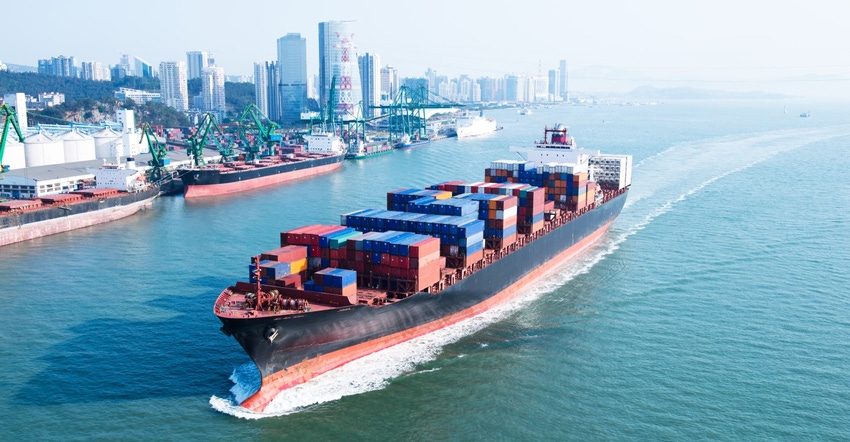Federal Maritime Commission signs MOU with Department of Justice as the supply demand imbalance likely to continue.

In maritime shipping, the global marketplace has rapidly consolidated. In 2000, the largest 10 shipping companies controlled 12% of the market. Today, it is more than 80%, leaving domestic manufacturers who need to export goods at these large foreign companies’ mercy. In a recent executive order signed by the President, the administration specifically encourages the Federal Maritime Commission to ensure vigorous enforcement against shippers charging American exporters exorbitant charges.
“This has let powerful container shippers charge exporters exorbitant fees for time their freight was sitting waiting to be loaded or unloaded. These fees, called ‘detention and demurrage charges,’ can add up to hundreds of thousands of dollars,” the White House fact sheet explains.
The whole issue of lack of container access is a real dilemma and some ag sectors are impacted greater than others. The pork industry for example gets a premium for exporting fresh versus frozen cuts. But when the supply chain isn’t operating as efficiently, they’re going to suffer as a result, says Mike Steenhoek, executive director of the Soybean Transportation Coalition.
The cost to move a container from China to the U.S. West Coast has a spot rate of $6,288, while the cost to move containers full of goods from the West Coast back to China is $986, he explains. With those rates at six times the value of bringing in the product from China to the U.S. versus taking from the West Coast to China, it’s no wonder those Chinese shippers are trying to turn those boats back around as quick as they can.
Steenhoek says the overwhelming reason we’re in this situation is the seismic shift in consumer spending and the unexpected stress on worldwide manufacturing and logistics as a result. Many manufacturers are realizing they can’t afford to get caught in another situation that COVID pandemic shutdowns created in the just-in-time delivery of goods.
Steenhoek expects the supply chain challenges to continue. “Having the global supply chain under stress will continue through 2021 and likely into 2022,” he says. He expects to see a bit more return to normalcy but that supply and demand imbalance when it comes to transportation services will be there throughout 2021.
MOU details
The Department of Justice’s Antitrust Division and the Federal Maritime Commission have signed the first interagency Memorandum of Understanding to foster cooperation and communication between the agencies to enhance competition in the maritime industry. Acting Assistant Attorney General Richard A. Powers and FMC Chairman Daniel Maffei signed the MOU between the Antitrust Division and the FMC effective immediately following the earlier announcement of the Executive Order on Promoting Competition in the American Economy.
Steenhoek says the MOU is a way for the administration to show their recognition of the ongoing shipping concerns as a priority and a way to direct resources at the Department of Justice leveraged towards this as well. “This also makes sure there’s a seamless effort to help address this,” he adds.
Steenhoek cautions whether mandating certain amounts of shipments for specific modes and industries is the right response.
“You always have to be careful when you start to impose how these modes and industries behave in trying to assign a regulatory fix,” Steenhoek says. “I’m not saying it’s never good, but sometimes just like when you squeeze a balloon, you mitigate pressure in one area but that augments it in another area. A proposed regulatory solution may have that same effect.”
He says those ag shippers may see some benefit of a relief at first, but all of a sudden it may become more costly or less efficient elsewhere.
Key provisions of the MOU facilitate communication and cooperation between the agencies. In particular, the MOU establishes a framework for the Antitrust Division and the FMC to continue regular discussions and review law enforcement and regulatory matters affecting competition in the maritime industry. The MOU includes provisions to establish periodic meetings among the respective agencies’ officials. The MOU also provides for the exchange of information and expertise that may be relevant and useful to the agencies’ oversight and enforcement responsibilities, as appropriate and consistent with applicable legal and confidentiality restrictions.
“Collaboration between the Antitrust Division and the FMC is important to ensuring healthy competition in the maritime industry,” says Powers. “Our partnership with the FMC is one of the many ways in which the Antitrust Division is prepared to play its role in achieving the competition objectives of the President’s Competition Executive Order.”
“The Federal Maritime Commission has an important enforcement role as an economic regulator of a vital industry,” says Maffei. “As such, we will continually assess how the agency can improve its capacity to protect the integrity of the marketplace. This memorandum between the Commission and the Department of Justice supplements and strengthens the FMC’s ability to detect, address, and pursue violations of the law or anticompetitive behavior by those we regulate.”
About the Author(s)
You May Also Like




.png?width=300&auto=webp&quality=80&disable=upscale)
